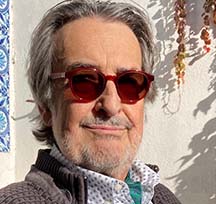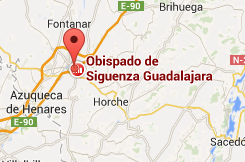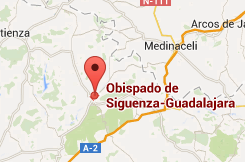 Por José Ramón Díaz-Torremocha
Por José Ramón Díaz-Torremocha
(Conferencia de Santa María la Real en Guadalajara)
Email del autor: Esta dirección de correo electrónico está siendo protegida contra los robots de spam. Necesita tener JavaScript habilitado para poder verlo.
ATENCION: Al finalizar el artículo que sigue en español, está su traducción al idioma inglés. Si algún lector deseara que se le enviaran estos artículos directamente a otro consocio o amigo, indíquelo como viene sucediendo a la dirección electrónica Esta dirección de correo electrónico está siendo protegida contra los robots de spam. Necesita tener JavaScript habilitado para poder verlo. facilitando la dirección electrónica del consocio o amigo. Al igual que aquellos que no quieran seguir recibiéndolos, indíquelo en la misma dirección de correo. Muchas gracias por su atención.
YOUR ATTENTION: At the end of the following article in Spanish, there is a translation into English. If any reader wish that other fellow member or friend would receive these articles directly, please send a message as usual to Esta dirección de correo electrónico está siendo protegida contra los robots de spam. Necesita tener JavaScript habilitado para poder verlo., indicating their e-mail address. For, those who do not want to receive them anymore, please send a message to the same e-mail address. Thank you very much.
En algún momento yo mismo, he propuesto a algún consocio/a como candidatos a la Presidencia General. No he tratado nunca de hacer campaña que, por otro lado, la Regla de la SSVP, que yo recuerde, no prohíbe. No, no he hecho campaña, pero ¿cómo evitar mi obligación moral de manifestar desde la experiencia de los años de servicio a las Conferencias a los consocios que me piden les ayude señalando a los consocio/as que me parecen más idóneos para tal servicio? Es tan clara esta obligación, como la contraria: esto es las veces que me he negado a presentar y avalar a algún consocio que me lo pedía y que no me parecía adecuado para tan importante y crucial servicio. Desde mi punto de vista, el simple hecho de solicitarlo, de desear serlo y no de que te lo soliciten otros consocios, ya descalifica a quien lo desea. Te queda siempre la duda.
Una cosa es aceptar un sacrificio ante el servicio que se nos solicita y otra, muy diferente, es pretender el servicio en beneficio propio sin saber muy bien cual es al beneficio al que se pretende aspirar.
Recuerdo siendo muy joven, escuchar o leer, ya no recuerdo si de una manera u otra llegó a mi conocimiento, defender tajantemente a un ya viejo ministro de Educación español que aun cuando el refrán español decía “piensa mal y acertarás”, él quería pensar bien aunque se equivocara. En ese pensar bien quiero quedarme, pero sin olvidar nuestra obligación de buscar al mejor en todos los órdenes.
Me resulta difícil siempre, no acudir a las recomendaciones del Papa Benedicto XVI, en este caso sobre la atención a toda clase de pobrezas cuando pensamos en ella, en la pobreza y cómo combatirla.
Escribe el Papa “Pero la referencia a la globalización debería abarcar también la dimensión espiritual y moral, instando a mirar a los pobres desde la perspectiva de que todos comparten un único proyecto divino, el de la vocación de construir una sola familia en la que todos —personas, pueblos y naciones— se comporten siguiendo los principios de fraternidad y responsabilidad.
Se ha de tener una visión amplia y articulada de la pobreza. Si ésta fuese únicamente material, las ciencias sociales, que nos ayudan a medir los fenómenos basándose sobre todo en datos de tipo cuantitativo, serían suficientes para iluminar sus principales características. Sin embargo, sabemos que hay pobrezas inmateriales, que no son consecuencia directa y automática de carencias materiales. Por ejemplo, en las sociedades ricas y desarrolladas existen fenómenos de marginación, pobreza relacional, moral y espiritual: se trata de personas desorientadas interiormente, aquejadas por formas diversas de malestar a pesar de su bienestar económico. Pienso, por una parte, en el llamado «subdesarrollo” moral» y, por otra, en las consecuencias negativas del «superdesarrollo»[i]”
Estoy bien seguro qué en los próximos años, hemos de profundizar en las Conferencias, para sentir y asumir bien el concepto de pobreza que por nuestra comodidad física e intelectual tantas veces hemos reducido a la falta de bienes materiales.
¡Hay tantos que lloran a nuestro alrededor y que nos pasan desapercibidos!
Me gustaría escuchar al próximo presidente general, demandar a las Conferencias sobre las ayudas a tantos “pobres ricos” que se encuentran a nuestro alrededor en el mundo. Me gustaría que nos dejara a cada consocio/a la pregunta sobre lo que significa para cada uno “ser pobre”.
No se trata de abandonar a aquellos de los que hoy nos ocupamos y preocupamos en mayor medida. No. Se trata de “ir más allá” de recorrer nuevos caminos siempre en servicio a los que sufren. No nos olvidemos de pedir al Espíritu que nos ayude en nuestra propuesta de candidatos, como en la valoración que hagamos de cada uno de ellos
Nada más, también nada menos. Seguiremos comentando sobre la trascendental elección que nos espera.
A Cristo, con y por María
José Ramón Díaz-Torremocha
Conferencia Sta. María la Mayor
Guadalajara, España
ALWAYS BEYOND
At some point, I myself have proposed a fellow member as a candidate for the General Presidency. I have never tried to canvass, which, on the other hand, the SSVP Rule, as far as I remember, does not forbid. No, I have not been canvassing, but how can I avoid my moral obligation to express my experience of years of service in the Conferences to the members who ask me to help them by indicating the members who seem to me most suitable for such a service? This obligation is as clear as the opposite: that is, the times I have refused to present and support a fellow member who asked me to do so and who did not seem to me to be suitable for such an important and crucial service. From my point of view, the simple fact of requesting it, of wanting it and not being asked for it by other members, already disqualifies the person who wants it. You are always left in doubt.
It is one thing to accept a sacrifice in the face of the service we are asked to provide, and quite another to claim the service for one's own benefit without knowing very well what the intended benefit is.
When I was very young, I remember hearing or reading, I am not sure about the way it came to my knowledge, an already old Spanish Minister of Education defend categorically that even though the Spanish proverb said "think wrong and you will be right", he wanted to think right even if he was wrong. I want to remain in this right thinking, but without forgetting our obligation to seek the best in all areas.
It is always difficult for me not to refer to the recommendations of Pope Benedict XVI, in this case on the concern for all kinds of poverty when we think about poverty and how to overcome it.
The Pope writes: "However, the reference to globalization should also include the spiritual and moral dimension, urging us to look at the poor from the perspective that all share a single divine project, namely, the vocation to build a single family in which all - individuals, peoples and nations - behave according to the principles of fraternity and responsibility.
A broad and articulated vision of poverty is needed. If poverty were only material, the social sciences, which help us to measure phenomena mainly on the basis of quantitative data, would be enough to shed light on its main characteristics. However, we know that there is immaterial poverty, which is not a direct and automatic consequence of material deprivation. For example, in rich and developed societies, there are phenomena of marginalisation, relational, moral and spiritual poverty: these are people with inner confusion, afflicted by various forms of unrest despite their economic well-being. I am thinking, on the one hand, of the so-called "moral underdevelopment" and, on the other hand, of the negative consequences of "overdevelopment"...".[ii]”
I am quite sure that in the coming years, we must go deeper in the Conferences, in order to feel and accept the concept of poverty which, because of our physical and intellectual comfort, we have so often reduced to the lack of material goods.
There are so many who cry all around us and who go unnoticed!
I would like to hear the next President General ask the Conferences about the help to so many of the "rich poor" that are all around us in the world. I would like him to ask to each member the question of what "being poor" means to them.
It is not a question of abandoning those we are most concerned about and serve today. No. It is a question of "going beyond", of treading new paths, always in the service of those who suffer. Let us not forget to ask the Spirit to help us in our proposal of candidates, as well as in the evaluation we make of each one of them.
Nothing more, nothing less. We will continue to comment on the crucial election that awaits us.
To Christ, with and through Mary
José Ramón Díaz-Torremocha
Conference of Sta. María la Mayor
Guadalajara, Spain
[i] Papa Benedicto XVI a las XLII Jornada Mundial de la Paz del 1 de enero de 2009
[ii] Pope Benedict XVI to the XLII World Peace Day on 1st January 2009

















